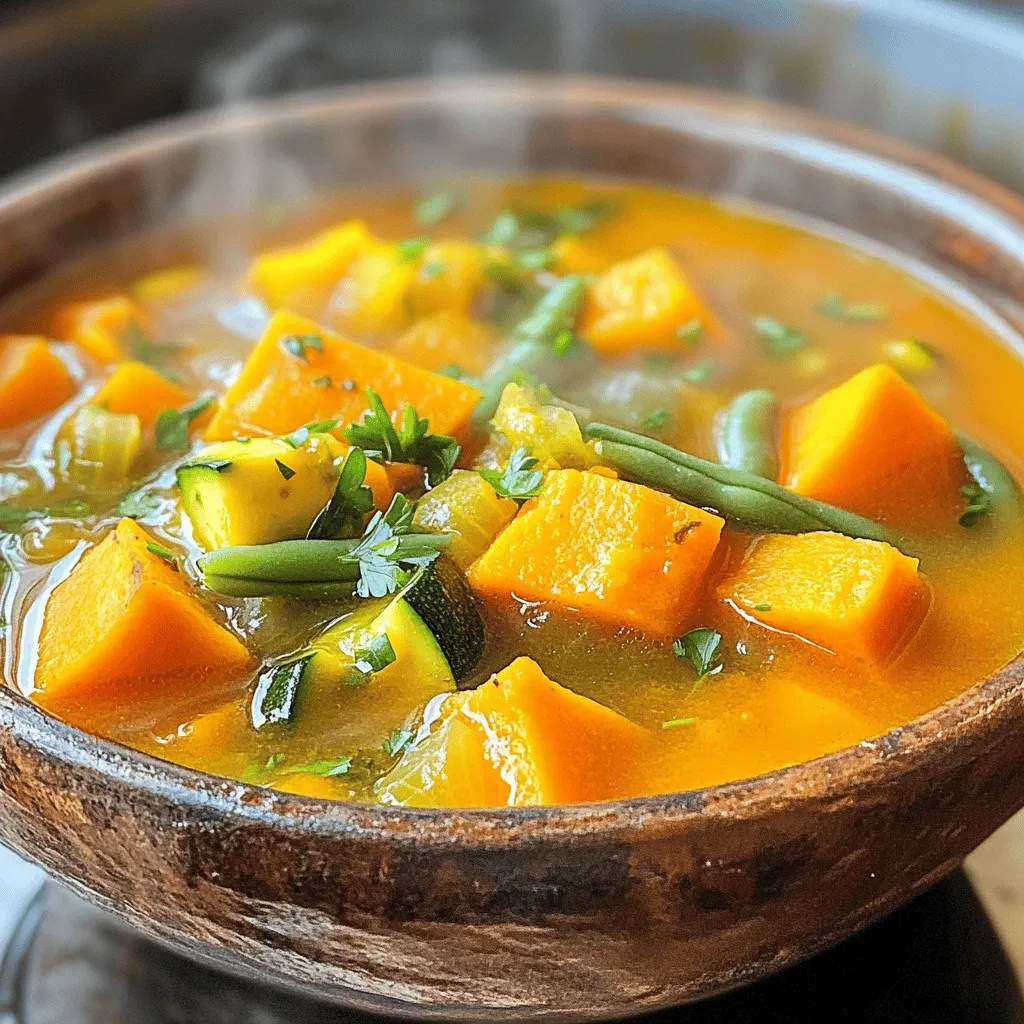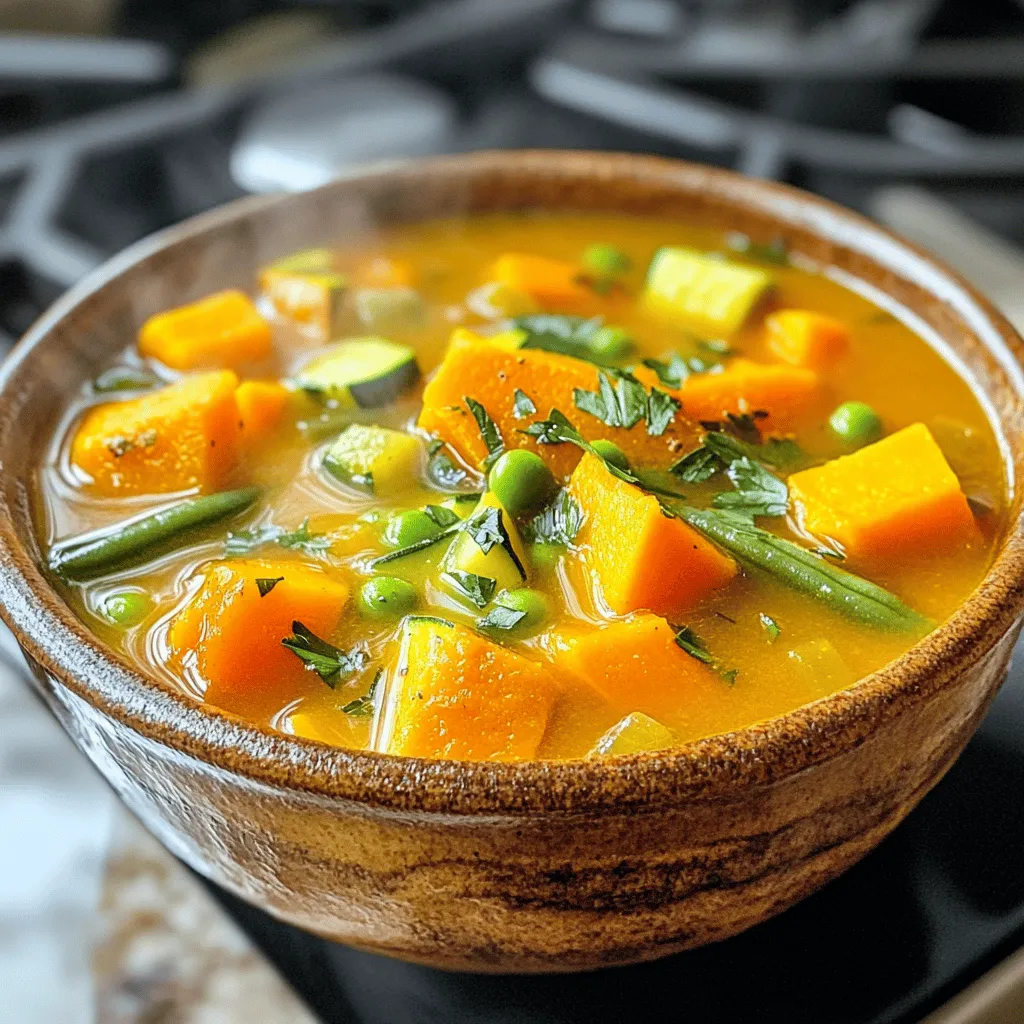As the leaves turn golden and the air grows crisp, there’s nothing quite like a warm bowl of Fall Harvest Vegetable Soup. This comforting dish is packed with fresh, seasonal vegetables, providing not only flavor but also essential nutrients. In this article, I’ll guide you through choosing organic ingredients, step-by-step cooking instructions, and tips for enhancing the flavors. Dive in and discover how to make a nutritious meal that celebrates the bounty of fall!
Ingredients
List of Fresh Produce Needed
For this Fall Harvest Vegetable Soup, fresh produce is key. Seasonal vegetables bring out the best flavors. I love using:
– 1 medium onion, finely diced
– 2 cloves garlic, minced
– 2 medium carrots, peeled and diced
– 2 stalks celery, diced
– 1 medium sweet potato, peeled and cut into 1/2-inch cubes
– 1 cup butternut squash, peeled and cubed
– 1 cup green beans, trimmed and cut into 1-inch lengths
– 1 medium zucchini, diced
Using organic ingredients is also important. They offer better taste and are better for you. When you buy organic, you avoid harmful chemicals. This makes your soup not just tasty but also healthier.
Pantry Staples Required
You also need some pantry staples for this soup. These include:
– 4 cups low-sodium vegetable broth
– 1 can (14 oz) diced tomatoes in juice
– 1 tablespoon extra virgin olive oil
– 1 teaspoon dried thyme
– 1 teaspoon ground cumin
– Salt and freshly ground black pepper to taste
Spices and seasonings are the heart of this soup. They add depth and warmth to every spoonful. Low-sodium broth keeps it light while still being flavorful. You can use other broths too, but vegetable broth is my favorite.
Nutritional Benefits
This soup is packed with health benefits. Each ingredient has its own perks:
– Onions and garlic boost your immune system.
– Carrots are high in beta-carotene, great for your eyes.
– Sweet potatoes provide fiber, which is good for digestion.
– Butternut squash is full of vitamins A and C.
– Green beans are a low-calorie source of fiber.
– Zucchini is hydrating and low in carbs.
Using seasonal produce makes it even better. Seasonal veggies are fresher and tastier. They contain more nutrients because they are picked at their peak. Eating seasonal food also helps local farmers and reduces your carbon footprint.
For the full recipe, check out the details above.
Step-by-Step Instructions
Preparation and Cutting Techniques
To start, gather your fresh vegetables. Use a sharp knife for safety and ease.
– Dicing Onion: Cut off both ends. Slice the onion in half. Place the flat side down. Make vertical cuts, then slice horizontally. This gives you fine dice.
– Garlic: Smash the clove with the knife. Peel off the skin. Chop finely for a strong flavor.
– Carrots and Celery: Cut the ends and peel the carrots. Slice them into even rounds. For celery, slice into small pieces. This helps them cook evenly.
– Sweet Potato and Butternut Squash: Cut these into 1/2-inch cubes. This size ensures a nice texture in the soup.
– Green Beans and Zucchini: Trim the ends of the beans. Cut into 1-inch pieces. Dice the zucchini into small cubes.
To maximize flavor during cooking, always start with the aromatics. Sauté onions and garlic first. This builds a strong base for your soup.
Cooking Process
1. Heat the olive oil in a large pot over medium heat.
2. Add the diced onion. Cook for 3-4 minutes until soft.
3. Stir in the minced garlic. Cook for 1 minute until fragrant.
4. Next, add the carrots, celery, sweet potato, and butternut squash. Cook for 5-7 minutes, stirring often. This allows them to soften.
5. After that, mix in the green beans and zucchini. Cook for another 3-4 minutes. Keep stirring for even cooking.
6. Pour in the canned tomatoes with juice and the vegetable broth. Add the thyme and cumin. Stir well to combine all flavors.
7. Increase the heat to bring it to a gentle boil. Once boiling, lower the heat and simmer uncovered for 20-25 minutes. This helps all the flavors blend.
Final Adjustments
After cooking, it’s time to taste. Add salt and pepper to your liking. This step is key for balance.
For garnishing, use fresh parsley or basil. Chop it finely and sprinkle on top. This not only adds color but also a fresh taste.
This soup is comforting and perfect for fall. It warms you up and fills you up. You can find the full recipe in the article for detailed steps and exact measurements.
Tips & Tricks
Enhancing Flavor Profiles
To boost your soup’s flavor, consider adding fresh herbs like rosemary or sage. These herbs bring warmth and depth. You can also add spices like smoked paprika or a pinch of cayenne for some heat.
When cooking, use a technique called “sweating.” This means cooking onions and garlic slowly to release their flavors. This step builds a solid base for your soup.
Common Mistakes to Avoid
One common mistake is overcooking vegetables. This can make them mushy and dull in taste. To avoid this, cook them just until tender.
Another tip is to season your soup gradually. Start with a little salt and pepper. Taste as you go to find the right balance. This way, you won’t overpower the fresh flavors.
Presentation Suggestions
For serving, ladle your soup into deep bowls. This adds a nice touch. You can also serve it with crusty bread for dipping.
To elevate your soup’s appearance, drizzle some olive oil on top right before serving. A sprinkle of fresh herbs makes it look great too. These small touches can turn a simple meal into a feast.
You can find the full recipe in the earlier sections. Enjoy making your Fall Harvest Vegetable Soup!

Variations
Vegetarian and Vegan Modifications
For a vegetarian or vegan soup, choose vegetable broth. You can use homemade or store-bought options. Look for low-sodium varieties to keep the flavor balanced. You can also add plant-based proteins. Chickpeas or tofu work well. They add great texture and protein.
Hearty Additions
To make the soup heartier, mix in beans or lentils. They boost the fiber and protein content. Use canned beans for ease, or cook dried beans in advance. Lentils cook quickly and add a nice bite.
You can also use grains for extra texture. Quinoa or barley are great choices. They absorb flavors and make the soup filling. Add them during the cooking process to let them soften.
Seasonal Adaptations
Switch up vegetables based on what’s fresh. In fall, root veggies shine, but in spring, you might add peas or asparagus. This keeps the soup vibrant and seasonal.
Also, think about flavor pairings for different seasons. Try adding lemon zest in spring for brightness. In winter, a hint of nutmeg can warm the dish. This keeps your soup exciting all year round. Check out the Full Recipe for more ideas!
Storage Info
How to Store Leftover Soup
After enjoying your Fall Harvest Vegetable Soup, store any leftovers in the fridge. Use a clean, airtight container. Glass jars or plastic containers work well. Make sure the soup cools down before sealing. This helps keep it fresh and tasty.
Freezing Guidelines
To freeze your soup, let it cool completely first. Then, pour it into freezer-safe bags or containers. Leave some space at the top for expansion. Label each bag with the date and type of soup. When you want to eat it, thaw it overnight in the fridge. For quick thawing, place the bag in cold water.
Reheating frozen soup is easy. Use a pot on the stove over low heat. Stir often to prevent sticking. You can also use a microwave, but be sure to cover it. Heat in short bursts and stir in between. This keeps the soup from getting too hot in spots.
Reheating Tips
When warming up leftover soup, the stove is best. Pour it into a pot and heat it gently. This way, you keep the flavors intact. If using a microwave, cover the bowl to avoid splatters.
After reheating, taste the soup again. You might need to add a little salt or pepper. This helps restore the flavor after storage. If it seems thick, add a splash of vegetable broth or water to loosen it. Enjoy every warm, hearty bite!
FAQs
How long does Fall Harvest Vegetable Soup last in the fridge?
Fall Harvest Vegetable Soup can last up to five days in the fridge. To keep it fresh, store it in an airtight container. Make sure the soup is cool before sealing the container. This helps keep the flavors intact and prevents spoilage. Check for any signs of spoilage, like off smells or changes in color, before eating.
Can I make this soup in advance?
Yes, you can make this soup in advance. I often prepare it a day or two before I plan to serve it. This allows the flavors to mix well. To store, let the soup cool before pouring it into a container. When you’re ready to eat, just reheat it on the stove over low heat. Stir it well to ensure even heating. You may want to add a bit of water or broth to adjust the thickness.
What are some good side dishes to serve with this soup?
To enhance your meal, serve this soup with crusty bread. A simple green salad also works well. You can try a light vinaigrette to add a nice touch. For a heartier option, pair it with grilled cheese sandwiches. These choices complement the soup’s flavors and make for a satisfying meal.
In this article, we explored the ingredients, cooking steps, and variations for a delicious Fall Harvest Vegetable Soup. We emphasized the value of fresh, organic produce and pantry staples. You learned about preparation, enhancing flavors, and common mistakes to avoid. I shared tips for storing and reheating soup, along with answers to your most frequently asked questions. Remember, cooking is an art, so don’t be afraid to make it your own. Enjoy the warmth and comfort of your homemade soup all season long.




